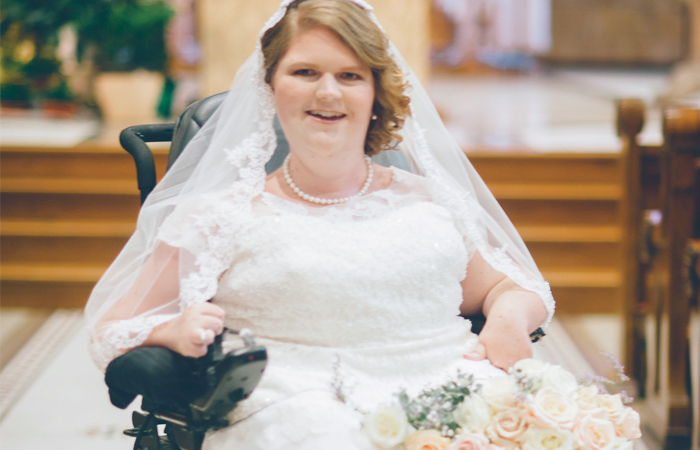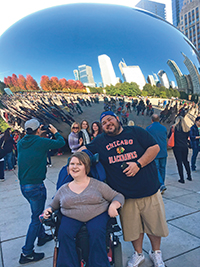
In Sickness and in Health

A newlywed with SMA learns that the joys and challenges of marriage are similar with or without a disability
Have you seen the ridiculous meme going around the internet that asks people if they would stay with their spouse if their spouse ended up in a wheelchair? Every time I see it, it makes my blood boil, especially when people hesitate with their answer. It is upsetting that this is even a question to be asked. Marriage is a commitment, and a disability should not change that. But not everyone sees it that way. Fortunately, my husband Russel and I both do.
Russel and I were married in April 2016. We met online, started dating long-distance and soon became not-so-long-distance when Russel moved to my city so that we could be closer. We dated for a year and a half before we were engaged, and then got married 10 months later. It’s been a wild ride so far — joyous and frustrating, challenging and wonderful.
Our relationship hasn’t been without its bumps and turns, but as we grow, I am learning that these are the same bumps and turns everyone faces. They may just look a little different from a wheelchair.

I had always been cautious about imagining myself in a relationship. I feared I would have less to offer my partner than my able-bodied friends and would need more from a partner. Our marriage has been a learning experience for me — learning that I’m not so different, that we’re not so different.
To give
When I was younger, I feared that I would not be able to contribute enough to a relationship. I knew that I couldn’t cook or clean or do many of the things that spouses are expected to do. Trust me, I am no June Cleaver — but really, who is?
Over the years, I’ve had to abandon my images of the “ideal wife” and accept my reality. I may not be perfect, but I’m perfectly his. Through this process, I am also discovering that, despite my previous conceptions, my husband and I are not so different from the average American couple with their 2.5 kids.
Everyone has strengths and weaknesses. Some of my weaknesses are a little more obvious: I will not be setting out the place settings and punch bowl when we host a party, nor will I help with cleaning out the garage.
On the other hand, some of my strengths are also quite clear. I have a silly sense of humor and can lighten the mood when things are getting dull. I can draft a legal document in 30 minutes flat. And I am a fierce advocate for myself and for the people I care about. I will never let anyone trample on my toes or my husband’s toes — that’s my wheelchair’s job.
My husband has other strengths and weaknesses. He is kind, compassionate, far more organized than I am and has two good arms for changing the batteries in the smoke detector. Somehow, we just have to fit our strengths and weaknesses together — just like every other couple that we have met.
And to receive
When I was younger, I also worried that my needs would be too great for any partner to choose me. So I tried to downplay my disability on dating profiles, only to get rejected once I started communicating with someone. Gradually, I learned that I needed to be straightforward about who I am, and the right person would come along. He did.
I have spinal muscular atrophy (SMA), and I need assistance with basically everything. From the bathroom to the kitchen to hair and makeup to feeding the dogs, I rely on someone else’s hands. Many times those hands belong to one of my personal care attendants, but often they are my husband’s hands.
From the start, I knew that I would not want to rely on my husband for all physical assistance. That’s never really been my style. I wanted my own independence, and I wanted our marriage to be a marriage, not just a job. For that reason, I still rely on attendant care for many of my needs.
But the fact is that marriage is work. With or without a disability, a spouse is constantly working to meet the needs of his or her partner. My husband wants to be a part of my care because it is an important part of my life. He is ready to step in any time that I need him. When an attendant is sick, he can get me showered and ready in an hour and a half. He feeds me dinner several days a week, which really just means that we get to sit down and have dinner together without someone else interrupting. And he is there day in and day out helping with the important “little” things, like making coffee or taking off my shoes.
I hope to always be there for him, as well. I want him to feel he can always turn to me for a kiss.
Katrina Gossett Kelly, 32, is a business litigation attorney at Faegre Baker Daniels in Indianapolis. She lives downtown with her husband, Russel, and their three dogs. She also performs improv at ComedySportz Indianapolis.
Follow Katrina
Katrina Gossett Kelly has been a past contributor to Quest. Read All in a Day's Work, Weight Loss from a Wheelchair: My Plan (first-person article) and Women and Wellness.
Read More Stories
Read stories from around the MDA community — and share your own — on Strongly, the MDA blog. Visit Strongly to find personal stories from individuals living with neuromuscular diseases, research news and more. If you’re interested in sharing your story on Strongly, contact us at strongly@mdausa.org.
MDA Resource Center: We’re Here For You
Our trained specialists are here to provide one-on-one support for every part of your journey. Send a message below or call us at 1-833-ASK-MDA1 (1-833-275-6321). If you live outside the U.S., we may be able to connect you to muscular dystrophy groups in your area, but MDA programs are only available in the U.S.
Request Information